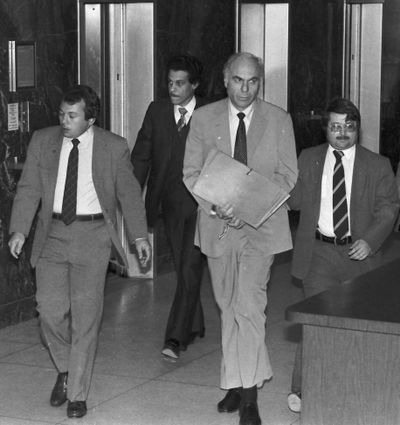CIA operative Wilson dies
Arms trade conviction, later overturned, tainted career

SEATTLE – Edwin Wilson set up front companies abroad for the CIA, made millions in the arms trade and entertained generals and congressmen at his sprawling Virginia farm.
His high-powered, jet-setting life in the 1970s and early 1980s followed a career in the CIA. But it came crashing down when he was branded a traitor and convicted in 1983 for shipping 20 tons of C-4 plastic explosives to Libya.
After two decades in prison, Wilson finally got the conviction overturned, convincing a judge that he had continued to work informally for the agency.
The man who once posed as a rich American businessman abroad spent his final years living with his brother near Seattle.
Wilson died Sept. 10 from complications from a heart valve replacement surgery, said Craig Emmick, a director at Columbia Funeral Home in Seattle. He was 84.
“Our family always supported him and believed in him,” his nephew, Scott Wilson, said Saturday, adding that the biggest part of his uncle’s vindication was “that the label of being a traitor would be taken off.”
“He never considered himself a traitor, of course,” Wilson added.
Wilson was born May 3, 1928, to a farming family in Nampa, Idaho. He worked as a merchant seaman, and earned a psychology degree from the University of Portland in 1953.
He joined the Marines and fought in the last days of the Korean War, according to his death notice. He went to work for the Central Intelligence Agency in 1955 after being discharged from the Marines.
Wilson entered the arms trade after leaving the CIA in 1971, according to a 2004 Washington Post article.
“I had a couple of villas that were very, very nice,” he told the newspaper at the time. “I had Pakistani houseboys, and I had Libyans working for me, typing up proposals in Arabic.”
In 1982, he was lured out of hiding in Libya and brought to New York for arrest.
A federal court in Virginia convicted him of exporting firearms to Libya without permission and sentenced him to 10 years. He was convicted in Texas in 1983, receiving a 17-year sentence for similar crimes.
A New York court also sentenced him to 25 years, to run consecutively with the Texas and Virginia sentences, for attempted murder, criminal solicitation and other charges involving claims that Wilson conspired behind bars to have witnesses and prosecutors killed.
At trial, Wilson said he made the sales to ingratiate himself with the Libyan government at the CIA’s request. While in prison, Wilson sought to prove his innocence by using the Freedom of Information Act to request government documents.
A federal judge threw out the conviction in 2003, saying the government had failed to correct information about Wilson’s service to the CIA that it admitted internally was false.
Wilson was released in 2004. He filed a civil lawsuit against seven former federal prosecutors and a former executive director of the CIA, but a judge in Houston dismissed the case in 2007, according to Seattlepi.com.
“He wanted to try to hold the people accountable that helped put him into prison,” his nephew said. “But he was never bitter.”